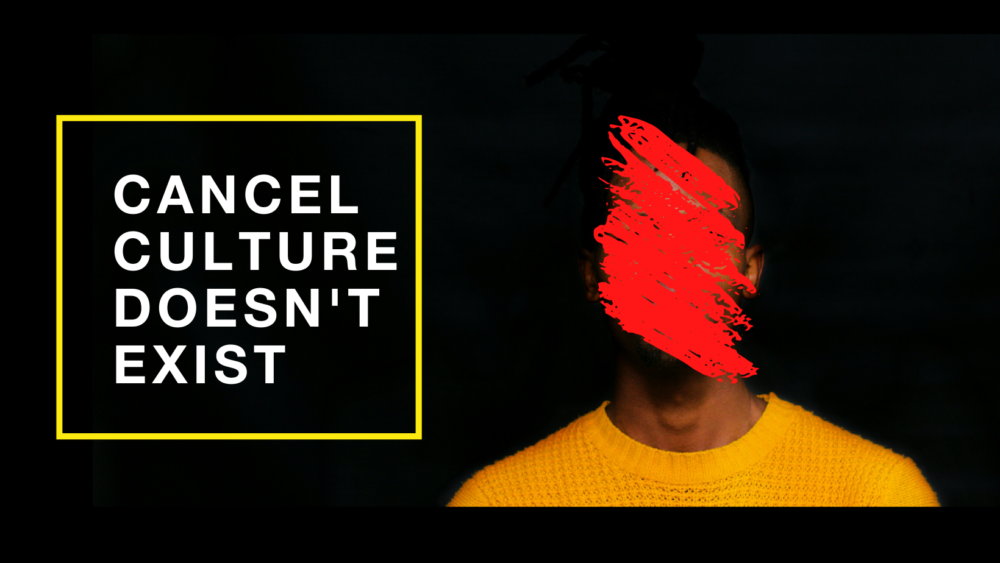Written by
Cancel Culture Doesn’t Exist
An open letter on the limitations of cancel culture.
Cancel Culture was initially used to describe personal disengagements from individuals who caused them harm, it’s now used to flippantly describe all public criticism.
The ever loosening usage of the term is forcing me to reconsider if it actually exists. Applied to a variety of situations, cancel culture has been used to describe everything from refusing to play R- Kelly’s music at parties to getting fired for using a racial slur during a live broadcast.
But for cancel culture to exist, it would require successful cancellations to take place and for a culture around that action to form.
Now cancellations rely on the idea that someone has been de-platformed and considering I am yet to find a cancellation target whose detractors are stronger than their employers integrity, I find this idea hard to justify.
One of the biggest conversations around de-platforming for the Black community was that of R.Kelly. In the aftermath of the decades-long conversation around Robert and his behaviour, Surviving R.Kelly revealed the extent of his abuse and presented our community with a choice.
Faced with the dilemma that listening to R-Kelly was directly funding the grooming, imprisonment and rape of young girls, people chose to cancel their engagement with Kelly’s music for a greater good.
However, since Robert’s arrest, we find that Kelly continues to exist as a beloved cultural figure whos fans will post his $100,000 bail, play his songs at public events and who’s catalogue can continue to be streamed.
This failure to act in a way which de-platforms cancellation targets, reveals where the true power in being able to cancel lies – with producers, not audiences. Take Hopkins for example. After being fired for using the Holocaust to justify her Islamaphobic views, LBC denied to confirm her resignation. Meanwhile, Hopkin’s platform at the far larger, MailOnline, was unaffected; meaning her platform remained unnegated.
And negation is a key part in a cancel culture, as grammar.com explains ‘cancel’ is “to neutralize or negate the force or effect of (another)”. Yet since the mid-2000s the definition of cancellation was synonymous with boycotting, reflectinga less organised and more personal choice being actioned. As such, individual, independent and localised actions fly in the face of collective behaviours which are understood as culture.
Loosely defined as the customs, ideas and societal behaviour of a particular people and society, cultures are a glue which bind strangers together by successfully expressing their shared ideology and similar behaviour.
The tradition around Guy Fawkes is one such example here. Celebrating the successful capture of a domestic terrorist, bonfire night sees people burning effigies and lighting fireworks around the same time each year with no central planning committee. This shared behaviour and understanding is key in justifying bonfire night is not just an event, but as evidence of culture.
As such, a cancel culture should be easy to identify. It should be identified by the target’s platform, who, through disengagement, successfully sees the person de-platformed. This is done with hopes of neutralising their audience reach and impact.
However, we are seeing ‘cancel culture’ being used by people who aren’t neutralised, whose works still exist and whose audience are largely indifferent to the controversy.
It means that cancel culture is being used to intentionally delegitimize the critics of a public figure, describing a role once fulfilled by the term ‘haters’.
This would imply that some wires have been subtly crossed here, one which argues that the detractors are boycotting media figures unjustly, proactively preventing them from engaging with new audiences.
However, when you consider that no target of a cancellation has successfully been de-platformed and has instead gone on to either retain their core audience or onto greater heights – then the idea of a cancel culture existing becomes absurd.
Because the current imagery implies cancel culture is being engaged as an organised campaign that serves an interest, has an aim and is successful at achieving that aim.
If the aim is to de-platform the target as a critic, we end up circling back to the dilemma that so far the examples of a cancel culture have been unsuccessful.
As such, we are left questioning what motivates the ‘mob’ of a cancel culture, what binds them together and what differentiates a critic from a harassing ‘troll’?
Imagining all of these people together as one, homogenous group with similar aims, shared behaviours and a history of successful outcomes, undermines the nuance needed when discussing online harassment, targeted abuse and impacts of trauma on group conflict. So until cancel culture looks like what it says on the tin, I’m pretty sure it does not exist.








